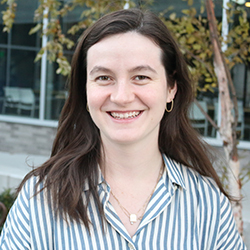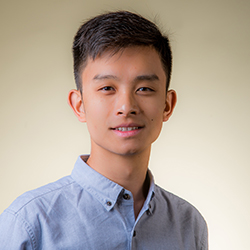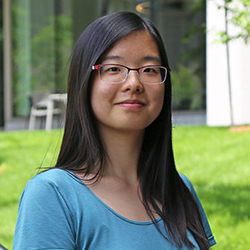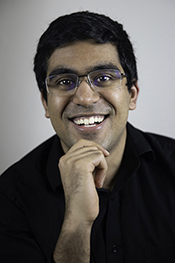Brown School of Engineering Ph.D. student Kiera Dwyer (biomedical engineering), as well as recent alumni Hannah Safford ’19 (biomedical engineering) , Brian Vuong ’19 (biomedical engineering), and Kit Sum Wu ’19 (mechanical engineering) have each won a three-year National Science Foundation (NSF) fellowship in the Graduate Research Fellowship Program. Additionally, two students who will graduate this spring, Nishanth Kumar ’21 (computer engineering) and Evan Dastin-van Rijn ’21 (biomedical engineering and neuroscience) were also honored with the Fellowship.
Thirty Brown students and alumni in science, technology, engineering and mathematics fields were chosen to receive tuition support and a stipend as promising young STEM leaders.
The NSF GRFP helps ensure the vitality of the human resource base of science and engineering in the United States and reinforces its diversity. The program recognizes and supports outstanding graduate students in NSF-supported STEM disciplines who are pursuing research-based masters and doctoral degrees at accredited United States institutions. NSF Fellows are anticipated to become knowledge experts who can contribute significantly to research, teaching, and innovations in science and engineering. These individuals are crucial to maintaining and advancing the nation's technological infrastructure and national security as well as contributing to the economic well-being of society at large.
175.jpg)
Kiera Dwyer is a second year graduate student advised by Assistant Professor Kareen Coulombe in the Coulombe Lab for Cardiovascular Regenerative Engineering at Brown University. She is currently studying the role of structure and mechanics in engineering cardiac tissue in order to better understand how such engineered tissue can be used to treat cardiac injury after a heart attack. She came to Brown after earning her undergraduate degree in chemical engineering from the University of Notre Dame.

Hannah Safford ’19 conducted undergraduate research focused on developing diagnostic biomaterials for the detection of bacteria in the lab of Professor Anita Shukla. Currently, Safford is a research technician in Professor Paula Hammond’s Lab at MIT where she develops nanoparticles to enhance the delivery of chemotherapeutics across the blood-brain barrier and into brain tumors. In graduate school, Safford plans to continue pursuing research in the fields of drug delivery and nanomedicine to improve the detection and treatment of disease.

While at Brown, Brian Vuong ’19 completed his honors thesis on novel cartilage preservation techniques under the mentorship of tissue engineer Bahar Bilgen and clinician Brett Owens. Vuong was also a member of the 2017 Stanford-Brown iGEM Team and interned at NASA Ames Research Center. He will begin his graduate studies this fall at Stanford, where he plans to engage in research related to biomechanics, assistive technology, and medical devices.

Kit Sum-Wu ’19 has continued her education at Princeton University in the Mechanical and Aerospace Engineering department after spending a year at Kyoto University in Japan under a Fulbright Fellowship. At Princeton, she is conducting research in experimental fluid mechanics. During her time at Brown, she was advised by Professor Kenny Breuer, and was an active member of the Engineering Departmental Undergraduate Group (ENGN DUG).

Evan Dastin-van Rijn ’21, a biomedical engineering and neuroscience concentrator, is conducting research under the guidance of his thesis advisor Assistant Professor David Borton and Associate Professor Matthew Harrison, on the development of novel data-processing methods to enable closed-loop neuromodulation therapies. Closed-loop neuromodulation holds promise for improving prospects for a variety of neurological conditions including pain, movement disorders, epilepsy, and psychiatric disorders by tailoring treatment variables to measures of a patient’s brain state in real-time. To facilitate the development of this approach, Dastin-van Rijn has designed methods for attenuating stimulation artifacts, accurately estimating data loss, and identifying signals of interest in recordings with missing data. Together, these methods will allow for the identification of neural biomarkers for future use as control signals for closed-loop therapies. As he heads to graduate school, Dastin-van Rijn plans to pursue research in neuroengineering to leverage neuroscience and engineering techniques to better understand mental health and treat mental illness.

Nishanth Kumar ’21 will continue his education at MIT, where he plans to continue his work at the intersection of robotics and artificial intelligence (AI) under former Brown Computer Science Professor Leslie P. Kaelbling. In graduate school, Kumar is particularly excited about enabling real-world robots to successfully perform more long-horizon tasks like cooking a meal or tidying a room. While at Brown, he has conducted research with Brown Computer Science Professors Stefanie Tellex, George Konidaris, and Michael Littman. He has also completed an honors thesis and is a member of the engineering honor society Tau Beta Pi.
The GRFP provides a yearly stipend, along with a $12,000 cost of education allowance for tuition and fees (paid to the institution), opportunities for international research and professional development, and offers the honoree the freedom to conduct his/her own research at any accredited U.S. institution of graduate education he/she chooses.